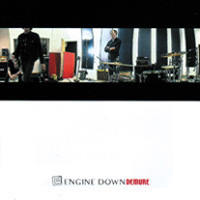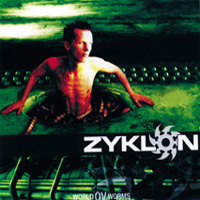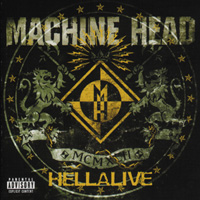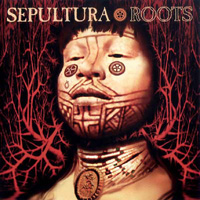 Sepultura
Sepultura
Roots (Roadrunner)
An interview with Max Cavalera
by Joe Carnabuci
Four strange young men form something called Sepultura and proceed to wreak havoc across the globe. After five crushing albums and endless touring, the band decides to return home. But not a home like you or I know. The jungle is their home, and the focal point of their sixth and most adventurous release to date. With Roots, Sepultura exposes their indigenous Brazilian roots in an artistic way. In other words, this is (to put it mildly) pure-to-the-ancestral-motherfuckin’-bone-heavy-as-shit-away-from-annoying-outside-influences-speaker-splatterin’-rock. But don’t let me tell you, let’s talk to the man himself, guitarist and vocalist, Max Cavalera.
The new album, Roots, is a lot slower in tempo than the last few records.
The whole band has always been committed to coming up with something different. We don’t want to be trapped, trendy or labeled; so we slowed it down. I think being fast for the sake of being fast is stupid. There’s one new song that’s fast, “Dictatorshit,” which sounds like a very old Discharge influenced kind of a song. We’ll mix up the fast stuff with the new songs for live, but for the most part, the new stuff is slower with more vibes on it all the way.
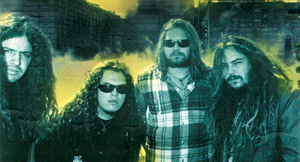 One track that really sticks out is “Ratamahatta.” Lots of extended percussion jams…
One track that really sticks out is “Ratamahatta.” Lots of extended percussion jams…
“Ratamahatta,” along with “Lookaway,” didn’t exist before we went into the studio. They were both written in two days during an unpredictable jam situation. It was cool because it kept the album fresh. We didn’t really plan the whole record before we went into the studio like most of the metal/rock bands do. This way, you really don’t know what’s going to happen, but you know something’s going to happen, which is cool, and a different way of working.
The album has a great vibe to it. There seems to be an unintentional hip hop flavor on some of the tracks.
I guess you can say that there’s a hip hop thing going on… probably because of the producer (Ross Robinson). He’s so into hip hop and stuff like that, he couldn’t help but bring it out somehow (laughs).
I definitely didn’t expect anything like it.
That’s what it’s there for, to get reactions like that. So far, it’s been grabbing everybody by the neck (with a tinge of pride, as if rattling somebody’s head), “Look, there’s more in Sepultura than you thought you would hear.” If I wanted to make the same record over and over, I might as well stop playing and go do a normal job where people tell me what to do. That’s how I see it. For me, music has got to be a challenge.
You’ve been around and popular for 13 years. That’s incredible for a metal band.
A lot of the metal bands went down because they really couldn’t progress any further. They got trapped into one style and their songwriting didn’t improve. They just got smaller and less interesting. I think we’re still around because, first, we love music; second, we’re really serious about our work; and third, we really enjoy doing this for ourselves. That’s the only way you can be in a band, if those things are right. If you’re not feeling good about the people you’re playing with, or if you’re not quite sure about the stuff you’re writing, then you should just fucking stop and do something else. I think that’s the key to Sepultura: be honest with yourself. Don’t lie to yourself. Don’t make a bullshit excuse like “Oh, things will get better.” If shit’s fucked up, you’ve got to fix it. Otherwise, it won’t get better.
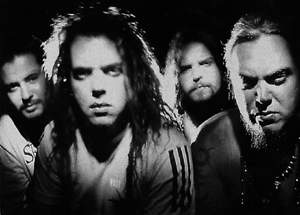 You play many different percussion instruments on this record. Is this something you picked up in the studio or have you always been into it?
You play many different percussion instruments on this record. Is this something you picked up in the studio or have you always been into it?
I played the berimbau on a couple of tunes. It’s a one-string instrument that kind of looks like a bow and arrow. I played that years ago just for fun, and I decided that it would be cool to get my own sound out of it. The berimbau I recorded with had a really nice, naturally distorted sound. This album has more than 17 different types of percussion, brought in by percussionist Carlinhos Brown. He had this huge case full of the craziest percussion you could possibly imagine.
That must have inspired some cool jam sessions.
Ross nicknamed us “the jam band” because we’d always be jamming with other musicians. (Laughing) He thought we were crazy and shit. In the early years, we did cover songs and had people singing with us. We always jammed with local Brazilian bands. On the last record, we had Jello Biafra (Dead Kennedys) write the lyrics for a song, but this time we actually had the musicians in the studio, which is much better. You get way more out of it. We had Mike Patton (Mr. Bungle, Faith No More) do some vocal work on “Lookaway,” and Jonathan Davis (Korn) wrote the lyrics and did vocals with me on that one as well. DJ Lethal, from House of Pain, programmed the drums. When you get all these crazy musicians together, something twisted has got to come out of it.
Mike Patton is a pretty twisted guy.
Yeah, man. I’m a big fan of his! We’ve known each other since ’91 when we did Rock In Rio. They (Faith No More) were the only band who talked to us, everybody else was too big to spend time with this “little ass Brazilian band.” Mike and the Faith No More guys were really cool to us, and since then, we’re kept in contact. I always wanted to do something really twisted with him musically. I think “Lookaway” really came out the way we thought it would.
On the track “Istári,” you actually went into the jungle and recorded with the Xavantes tribe.
That’s a big part of the concept of Roots. We went back to really old Brazilian roots of the Indians and recorded with them. Without that in the album, we would have changed the title. For me, it’s the theme of the record.
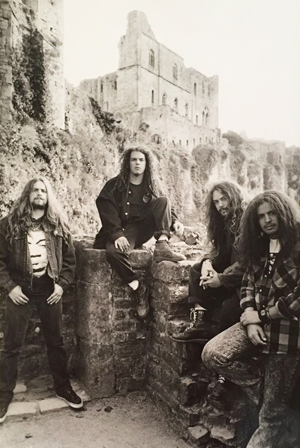 You have the Xavantes tribe chanting during the song. Did you ever have any contact with them before this meeting?
You have the Xavantes tribe chanting during the song. Did you ever have any contact with them before this meeting?
No. It’s really hard to get in to [see] them and I don’t blame them. They just don’t trust the white people. You need permits, and reasons why you’re going there, plus they’re so healthy that they don’t want people bringing sickness into the tribe. Everything there was pretty crazy… very magical and spiritual as hell. They live in a different world. We spent three days with them, eating their food and acting like them, learning their culture and exchanging ours as well.
What was going through your head during all of this?
Shit, I was thinking of so many things that it’s hard to remember. I was really excited because it was something I wanted to do for a long time and I was finally doing it. The whole thing was done in a really wild way. We flew there in a little airplane and the whole tribe was already waiting for us. There were twenty huts in the middle of nowhere, surrounded by jungle. I never expected, in my entire career, that I was going to do anything like that. No electricity… we had to bring car batteries to record on our 8-track. This album really goes from one extreme to the other… from complete tribal, rural recording, to the total urban vibe of “Cut Throat” and “Lookaway.”
Did your music shock them? How did they know about you?
The Chief knew of us because sometimes he goes into town. Sepultura is very popular in every corner of Brazil. He knew about us as a “metal band” and all that, but I don’t think he really knew the music. We played them “Kaiowas,” a song which is also on Chaos A.D. (Roadrunner), so they could get to see a different part of our music. They seemed to like it and were really excited when we played.
How is the current situation in Brazil?
It’s a little better. They have a president who seems more reasonable. He’s been exiled and shit, so he’s kind of like this hardcore guy. He understands the people a little more.
What about the police? I remember [on the] last tour you ran into a few problems with them.
Not this time. (Laughs) I was saved. I can tell they don’t really like us that much. Every time we go to the airport, we have to go to the federal police for passports and it’s always like “Oh (pause), Sepultura. OK. Bye.” They’re not very friendly, but I don’t give a shit. They’re just a bunch of fucking pigs anyway.
Has all the notoriety of being in a popular band affected you in any way?
Yeah, it makes me really disgusted with the whole thing. I work in a way [so as] to keep my integrity and maintain my roots. People think of “rock star dreams” and to me it’s complete bullshit. It’s like a fake dream world. Trapped in your own bubble world like Michael Jackson kind of shit.
So, I take it that you don’t “hang out with the stars”?
I have my tribe life, as far away from everybody as possible. I can kick back and get ready for when we go on tour.
When is the tour?
In March. There’s a possibility of getting a tour with Ozzy, which would be cool because we’re releasing a new record and he goes all over America. Probably a two or three month tour. After that, we’ll probably do our own headline tour. It’s been three years since the last one.

